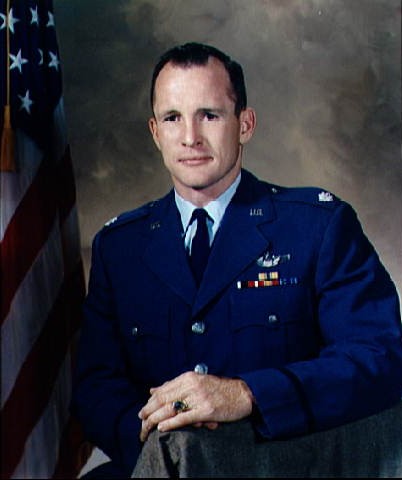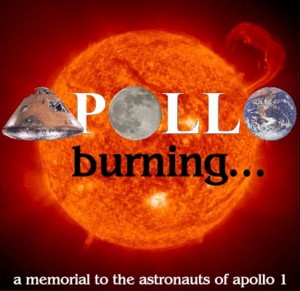 EDWARD
H. WHITE, II EDWARD
H. WHITE, II
(Lieutenant Colonel) NASA Astronaut PERSONAL DATA: Born in San Antonio, Texas, on November 14, 1930. Died January 27, 1967, at NASA Kennedy Space Center, Florida, in the Apollo spacecraft fire. He is survived by his wife Patricia and their two children. EDUCATION: Bachelor of Science degree from United States Military Academy; Master of Science degree in Aeronautical Engineering, University of Michigan. ORGANIZATIONS: Associate member of Institute of Aerospace Sciences; Member of Sigma Delta Psi, athletic honorary; and Member of Tau Beta Pi, engineering honorary. SPECIAL HONORS: Golden Plate Award; Honorary Doctorate degree in Astronautics, University of Michigan; NASA Exceptional Service Medal and Senior Astronaut Wings; Medalha Bandeirantes va Cosmonautica; Firefly Club Award; Ten Outstanding Young Men of the Nation for 1965; Five Outstanding Young Texans for 1965; The John Fitzgerald Kennedy Trophy; Aerospace Primus Club; 1966 Achievement Award, National Aviation Club; General Thomas White Award. EXPERIENCE: White, an Air Force Lieutenant Colonel, received flight training in Florida and Texas, following his graduation from West Point. He then spent 3-1/2 years in Germany with a fighter squadron, flying F-86's and F-100's. He attended the Air Force Test Pilot School at Edwards Air Force Base, California, in 1959. White was later assigned to Wright-Patterson Air Force Base, Ohio, as an experimental test pilot with the Aeronautical Systems Division. In this assignment he made flight tests for research and weapons systems development, wrote technical engineering reports, and made recommendations for improvement in aircraft design and construction. He logged more than 3,000 hours flying time, including more than 2,200 hours in jet aircraft. NASA EXPERIENCE: White was named as a member of the astronaut team selected by NASA in September 1962. He was pilot for Gemini 4, which was a 66-revolution, 4-day mission that began on June 3, and ended on June 7, 1965. During the third revolution, he carried out the first extra vehicular activity in the United States manned space flight program. He was outside Gemini 4 for 21 minutes, and became the first man to control himself in space during EVA with a maneuvering unit. Other highlights of the mission included cabin depressurization, opening of cabin doors, and 12 scientific and medical experiments. He received the NASA Exceptional Service Medal and the U.S. Air Force Senior Astronaut Wings for this Flight. On March 21, 1966, he was named as one of the pilots of the AS-204 mission, the first 3-man Apollo flight. Lieutenant Colonel White died on January
26, 1967, in the Apollo spacecraft flash fire during a launch pad test
at Kennedy Space Center, Florida.
(reprinted from NASA Astronaut Biographies) |
